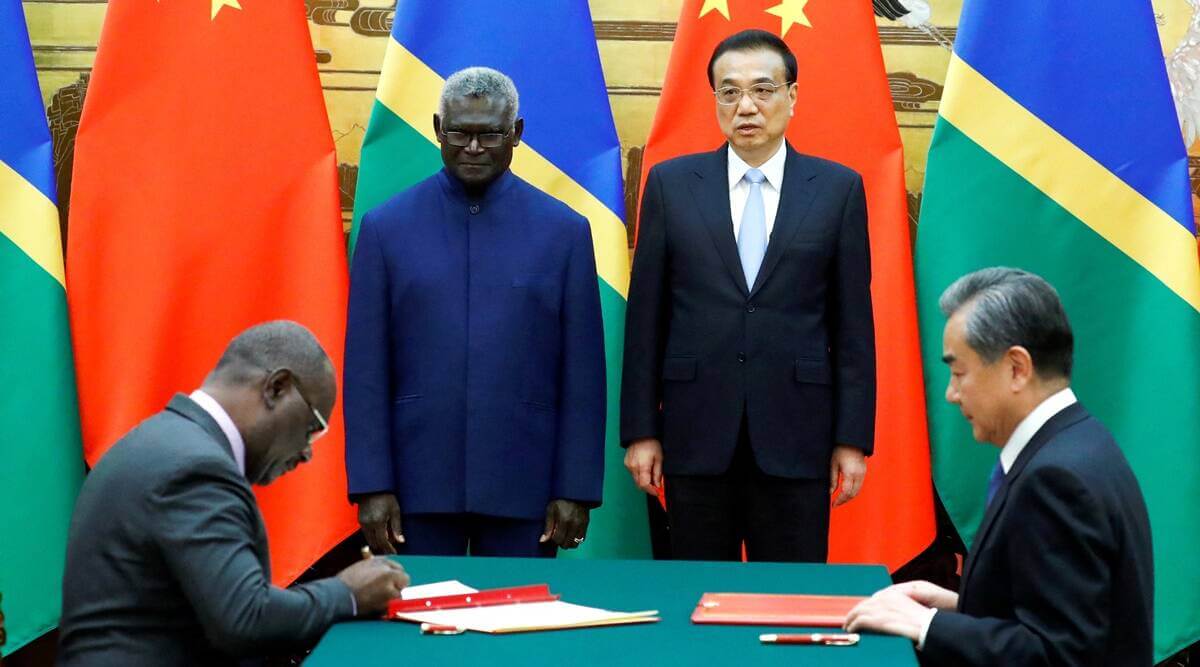The Solomon Islands on Thursday officially confirmed that it has signed a wide-ranging security pact with China that Western governments fear will increase Beijing’s military foothold in the South Pacific.
“Officials of [the] Solomon Islands and the People’s Republic of China have initialled elements of a bilateral Security Cooperation Framework between the two countries today,” a statement released by Prime Minister (PM) Manasseh Sogavare’s office read.
Without going into details, the Chinese Embassy in Honiara said on Thursday that the agreement will “further strengthen the bilateral cooperation between China and the Solomon Islands in areas such as disaster response, humanitarian aid, development assistance and maintaining social order to jointly address traditional and non-traditional security challenges.”
The China-Solomon Islands security cooperation agreement will deepen cooperation in keeping social order, protecting lives & property, humanitarian aid & disaster relief. It helps to keep Solomon Islands stable, promote peace & stability, increase common interests of the region. pic.twitter.com/kNaNZO6dl1
— Spokesperson发言人办公室 (@MFA_China) March 31, 2022
However, despite the statement’s optimism, a draft of the agreement that was leaked online last week indicated that the agreement would allow China to further expand its presence in the region by basing navy warships in the Pacific. The document will enable Beijing to station Chinese armed police, military, and “other law enforcement and armed forces” in the Solomons. Concerningly, the deal also outlines the potential for the establishment of a naval base on the island.
The news was met with widespread criticism from neighbouring countries, including Australia, Micronesia, and New Zealand. Former Australian PM Kevin Rudd said on Friday that the deal was “one of the most significant security developments we have seen in decades” and a security failure by the current Australian government in its “own territorial waters.”
Here we go. Federated States of Micronesia publicly urges Solomon Islands to ditch its "unprecedented" draft security treaty with China. FSM says the deal might "increase geopolitical tensions." It's the first Pacific Island state to publicly make such a call (beyond Aus + NZ) 1/ https://t.co/obAFatwbDU
— Stephen Dziedzic (@stephendziedzic) March 31, 2022
Mirroring the concern, New Zealand PM Jacinda Ardern said earlier this week that her administration is “gravely concerned” by the agreement and sees “very little reason in terms of the Pacific security for such a need and such a presence.” In a symbolic move, Auckland signed a cooperation agreement with Fiji on Tuesday that aims to strengthen security in the Indo-Pacific region.
In a similar vein, Australian Minister for Defence Peter Dutton previously said that Canberra “would be concerned” if “any military base” is established less than 2,000 kilometres off its coast. “We want peace and stability in the region. We don’t want unsettling influences and we don’t want pressure and coercion that we are seeing from China continuing to roll out in the region,” he noted. To this end, on Monday, Australian PM Scott Morrison asked Fiji and Papua New Guinea to help convince the Solomon Islands to abandon the deal before it was signed.
However, Sogavare dismissed these concerns and “unfortunate perceptions” as “insulting.”
The Solomon Islands signs wide-ranging security pact with China, an agreement Western nations fear will pave the way for the first Chinese military foothold in the South Pacifichttps://t.co/2pnOznBDd7 pic.twitter.com/Mm5u1ljo3Z
— AFP News Agency (@AFP) March 31, 2022
Referring to this perceived threat, the Chinese embassy said in a statement yesterday that the “security cooperation between the two countries is not directed at any third party” and will only “complement regional structures and other countries.” It also gave assurances that the agreement “is conducive to stability and security of the Solomon Islands” and will also help to “promote common interests of other countries in the region.” “Relevant parties are urged to respect the sovereignty and independence of China and the Solomon Islands on their bilateral security cooperation and stop irresponsible smears and spreading misinformation,” it added.
Chinese Foreign Ministry spokesperson Wang Wenbin also spoke about the deal during his regular press conference on Thursday. Wang stressed that the deal is a “legitimate right of two independent and sovereign countries” and is “consistent with the international law.” He also remarked that despite international criticism, “facts have proven” that the cooperation deal has gained “genuine popularity among the government and people [of the Solomon Islands].” The spokesperson also warned against making attempts “to provoke, obstruct and undermine China’s friendly relations with island countries.”

